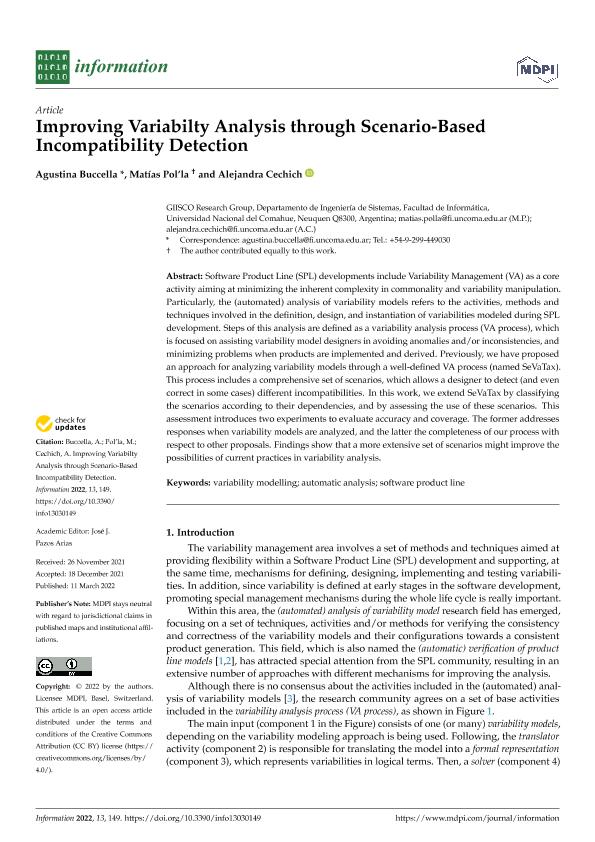Mostrar el registro sencillo del ítem
dc.contributor.author
Buccella, Agustina

dc.contributor.author
Pol'la, Matias Esteban

dc.contributor.author
Cechich, Susana Alejandra

dc.date.available
2023-10-27T18:24:51Z
dc.date.issued
2022-03
dc.identifier.citation
Buccella, Agustina; Pol'la, Matias Esteban; Cechich, Susana Alejandra; Improving Variabilty Analysis through Scenario-Based Incompatibility Detection; Multidisciplinary Digital Publishing Institute; Information (Switzerland); 13; 3; 3-2022; 1-27
dc.identifier.issn
2078-2489
dc.identifier.uri
http://hdl.handle.net/11336/216263
dc.description.abstract
Software Product Line (SPL) developments include Variability Management (VA) as a core activity aiming at minimizing the inherent complexity in commonality and variability manipulation. Particularly, the (automated) analysis of variability models refers to the activities, methods and techniques involved in the definition, design, and instantiation of variabilities modeled during SPL development. Steps of this analysis are defined as a variability analysis process (VA process), which is focused on assisting variability model designers in avoiding anomalies and/or inconsistencies, and minimizing problems when products are implemented and derived. Previously, we have proposed an approach for analyzing variability models through a well-defined VA process (named SeVaTax). This process includes a comprehensive set of scenarios, which allows a designer to detect (and even correct in some cases) different incompatibilities. In this work, we extend SeVaTax by classifying the scenarios according to their dependencies, and by assessing the use of these scenarios. This assessment introduces two experiments to evaluate accuracy and coverage. The former addresses responses when variability models are analyzed, and the latter the completeness of our process with respect to other proposals. Findings show that a more extensive set of scenarios might improve the possibilities of current practices in variability analysis.
dc.format
application/pdf
dc.language.iso
eng
dc.publisher
Multidisciplinary Digital Publishing Institute
dc.rights
info:eu-repo/semantics/openAccess
dc.rights.uri
https://creativecommons.org/licenses/by/2.5/ar/
dc.subject
AUTOMATIC ANALYSIS
dc.subject
SOFTWARE PRODUCT LINE
dc.subject
VARIABILITY MODELLING
dc.subject.classification
Otras Ciencias de la Computación e Información

dc.subject.classification
Ciencias de la Computación e Información

dc.subject.classification
CIENCIAS NATURALES Y EXACTAS

dc.title
Improving Variabilty Analysis through Scenario-Based Incompatibility Detection
dc.type
info:eu-repo/semantics/article
dc.type
info:ar-repo/semantics/artículo
dc.type
info:eu-repo/semantics/publishedVersion
dc.date.updated
2023-10-26T15:15:06Z
dc.journal.volume
13
dc.journal.number
3
dc.journal.pagination
1-27
dc.journal.pais
Suiza

dc.description.fil
Fil: Buccella, Agustina. Consejo Nacional de Investigaciones Científicas y Técnicas. Centro Científico Tecnológico Conicet - Patagonia Confluencia; Argentina. Universidad Nacional del Comahue. Facultad de Informatica; Argentina
dc.description.fil
Fil: Pol'la, Matias Esteban. Consejo Nacional de Investigaciones Científicas y Técnicas. Centro Científico Tecnológico Conicet - Patagonia Confluencia; Argentina. Universidad Nacional del Comahue. Facultad de Informatica; Argentina
dc.description.fil
Fil: Cechich, Susana Alejandra. Universidad Nacional del Comahue. Facultad de Informatica; Argentina
dc.journal.title
Information (Switzerland)
dc.relation.alternativeid
info:eu-repo/semantics/altIdentifier/url/https://www.mdpi.com/2078-2489/13/3/149
dc.relation.alternativeid
info:eu-repo/semantics/altIdentifier/doi/https://doi.org/10.3390/info13030149
Archivos asociados
